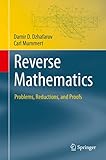Reverse Mathematics [electronic resource] : Problems, Reductions, and Proofs /
Material type: TextSeries: Theory and Applications of Computability, In cooperation with the association Computability in EuropePublisher: Cham : Springer International Publishing : Imprint: Springer, 2022Edition: 1st ed. 2022Description: XIX, 488 p. 1 illus. online resourceContent type:
TextSeries: Theory and Applications of Computability, In cooperation with the association Computability in EuropePublisher: Cham : Springer International Publishing : Imprint: Springer, 2022Edition: 1st ed. 2022Description: XIX, 488 p. 1 illus. online resourceContent type: - text
- computer
- online resource
- 9783031113673
- 004.0151 23
- QA76.9.M35
1 introduction -- Part I Computable mathematics: 2 Computability theory -- 3 Instance–solution problems -- 4 Problem reducibilities -- Part II Formalization and syntax: 5 Second order arithmetic -- 6 Induction and bounding -- 7 Forcing -- Part III Combinatorics: 8 Ramsey’s theorem -- 9 Other combinatorial principles -- Part IV Other areas: 10 Analysis and topology -- 11 Algebra -- 12 Set theory and beyond.
Reverse mathematics studies the complexity of proving mathematical theorems and solving mathematical problems. Typical questions include: Can we prove this result without first proving that one? Can a computer solve this problem? A highly active part of mathematical logic and computability theory, the subject offers beautiful results as well as significant foundational insights. This text provides a modern treatment of reverse mathematics that combines computability theoretic reductions and proofs in formal arithmetic to measure the complexity of theorems and problems from all areas of mathematics. It includes detailed introductions to techniques from computable mathematics, Weihrauch style analysis, and other parts of computability that have become integral to research in the field. Topics and features: Provides a complete introduction to reverse mathematics, including necessary background from computability theory, second order arithmetic, forcing, induction, and model construction Offers a comprehensive treatment of the reverse mathematics of combinatorics, including Ramsey's theorem, Hindman's theorem, and many other results Provides central results and methods from the past two decades, appearing in book form for the first time and including preservation techniques and applications of probabilistic arguments Includes a large number of exercises of varying levels of difficulty, supplementing each chapter The text will be accessible to students with a standard first year course in mathematical logic. It will also be a useful reference for researchers in reverse mathematics, computability theory, proof theory, and related areas. Damir D. Dzhafarov is an Associate Professor of Mathematics at the University of Connecticut, CT, USA. Carl Mummert is a Professor of Computer and Information Technology at Marshall University, WV, USA.


There are no comments on this title.